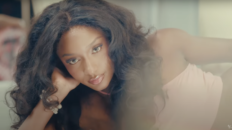
About the Song
There’s a reason Beyoncé simply needs one name. Queen Bey’s 2014 track “Yoncé” isn’t just a song; it’s a declaration, a strut down the red carpet of self-assured superstardom. It’s the sound of a woman owning her achievements, celebrating her success, and daring anyone to disagree.

From the opening gunshot snare drum, “Yoncé” pulsates with an infectious confidence. Beyoncé’s vocals drip with an effortless coolness, spitting out lyrics that leave no room for doubt: “I took my time, I carved my name, I built my legacy.” This isn’t your typical brag-and-boast anthem; it’s a self-aware celebration, acknowledging the hard work and dedication behind her rise to the top.

The music mirrors the lyrical boldness. The minimalist production with its pulsing bass and hypnotic melody is the perfect canvas for Beyoncé’s swagger. It’s not about bombast; it’s about precision, about channeling every ounce of energy into a sound that is both confident and controlled.

But “Yoncé” isn’t just about celebrating personal success. It’s also a rallying cry for all women, particularly women of color, who dare to dream big and break down barriers. Beyoncé throws out references to Michelle Obama and Serena Williams, acknowledging the collective struggle and triumph of women who refuse to be silenced or marginalized.

The music video is a visual feast that amplifies the song’s message. Beyoncé transforms into a series of powerful personas, from a glamorous Cleopatra to a fierce warrior queen. The imagery is striking, the choreography fierce, and the overall message clear: this is a woman who owns her narrative, redefines beauty standards, and refuses to be boxed in.

“Yoncé” wasn’t without its controversy. Some criticized its perceived arrogance and self-indulgence. But these critiques miss the point. This song isn’t about bragging; it’s about reclamation. It’s about a woman who has spent years fighting for her voice, her platform, and her right to be heard, finally taking ownership of her power and celebrating it unapologetically.

In a world that often tries to shrink women down, “Yoncé” dares to be big, bold, and unapologetically fabulous. It’s a reminder that confidence and success aren’t dirty words; they’re tools of empowerment, and Beyoncé wields them like a master.

So, crank up the volume, put on your fiercest outfit, and let “Yoncé” play. It’s a song for anyone who has ever doubted themselves, anyone who has ever felt marginalized, anyone who dares to dream big and claim their own space in the world. “Yoncé” is more than a song; it’s a movement, a call to action, and a reminder that sometimes, the best way to silence the doubters is to simply own your brilliance and let your light shine.

Fun Fact

Did you know? The music video features cameo appearances by well known supermodels Chanel Iman, Jourdan Dunn and Joan Smalls. Also, the iconic line, “I woke up like this,” wasn’t actually written by Beyoncé! It stemmed from a viral meme featuring women posting morning selfies with the hashtag #IWokeUpLikeThis. Beyoncé, ever the cultural sponge, incorporated the popular phrase into the song, giving it new meaning and injecting it with her signature self-assuredness. This clever nod to internet culture shows Beyoncé’s awareness of the contemporary landscape and her ability to seamlessly blend it with her own artistic vision. So next time you hear “Yoncé,” remember, Queen Bey isn’t just singing about waking up flawless; she’s commenting on a viral phenomenon and reclaiming the meme’s message for her own powerful anthem.
About the Artist
Born in Houston, Texas, in 1981, Beyoncé Giselle Knowles-Carter wasn’t destined for ordinary. Her voice, a force of nature from childhood, echoed in church choirs and talent shows, foreshadowing a rise unlike any other.
Destiny’s Child, the iconic girl group she helped forge in her teens, wasn’t just a launchpad; it was a revolution. Their anthems of female empowerment like “Say My Name” and “Independent Women Part 1” echoed across generations, rewriting pop music and empowering young women around the world.
But Beyoncé’s ambitions were boundless. Stepping onto the solo stage in 2003 with “Dangerously in Love,” she unleashed a sonic hurricane. Songs like “Crazy in Love” and “Naughty Girl” showcased not just her vocal prowess, but her fierce lyrics, captivating stage presence, and unapologetic embrace of female sexuality. She wasn’t just a pop star; she was a cultural force, redefining music and womanhood on her own terms.























